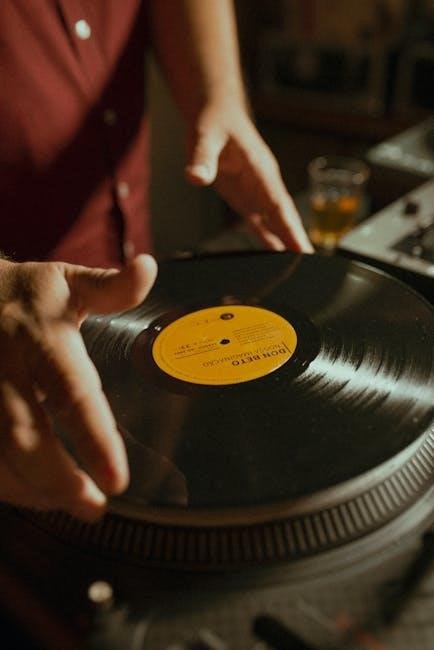Hookup culture refers to a lifestyle involving uncommitted sexual encounters between individuals not in a long-term relationship, reflecting shifting social norms and technological influences․
Defining Hookup Culture
Hookup culture is a social phenomenon characterized by uncommitted sexual encounters between individuals, often devoid of emotional intimacy or long-term relationship expectations․ It encompasses a range of activities, from kissing to intercourse, with no implied future commitment․ This culture is deeply embedded in modern society, particularly among younger generations, and is often associated with casual dating, parties, and social gatherings․ The rise of hookup culture reflects shifting societal norms, increased sexual liberation, and the influence of technology, such as dating apps․ It emphasizes physical satisfaction over emotional connection, creating a framework where sex is decoupled from relationships․ Hookup culture is both celebrated and criticized, with debates surrounding its impact on mental health, relationships, and societal values․
Prevalence of Hookup Culture in Modern Society
Hookup culture is prevalent in modern society, particularly among younger generations, with widespread acceptance and engagement in casual sexual encounters․ Studies indicate that a significant portion of individuals, especially those in academic settings like colleges, participate in hookups․ Social media, dating apps, and popular culture have normalized this behavior, making it a common aspect of social life․ The ease of connecting through technology has further fueled its growth, creating a culture where casual sex is both accessible and socially acceptable․ As a result, hookup culture has become a defining feature of contemporary dating and social interactions, reflecting broader shifts in societal values and norms surrounding sexuality and relationships․

Historical Context of Hookup Culture
Hookup culture emerged from shifting sexual norms in the mid-20th century, evolving through the Sexual Revolution and technological advancements, embedding casual encounters into modern society․
Evolution of Sexual Norms and Hookup Culture
The Sexual Revolution of the 1960s and 1970s laid the groundwork for modern hookup culture by challenging traditional norms around sexuality and relationships․ The rise of contraception, particularly the birth control pill, reduced the risks associated with casual sex, leading to increased openness about sexual experiences․ Over time, hookup culture has evolved through the influence of popular culture, media representation, and technological advancements such as dating apps․ These shifts have normalized casual sexual encounters, with society increasingly accepting uncommitted relationships as a natural part of modern life․ This evolution reflects broader changes in societal values, emphasizing personal freedom and autonomy in sexual choices․
Key Events That Shaped Hookup Culture
The rise of dating apps like Tinder and Bumble in the 2010s significantly influenced hookup culture by making casual encounters easily accessible․ The Sexual Revolution of the 1960s and 1970s challenged traditional norms, paving the way for greater sexual freedom․ Media portrayal of hookups in popular culture, such as in films and television shows, further normalized casual sex․ The AIDS crisis in the 1980s introduced a shift toward safer sex practices, which continue to impact hookup culture today․ These events collectively transformed societal attitudes, creating a culture where uncommitted sexual encounters are both accepted and expected․

Psychological and Social Factors Influencing Hookups
Self-concept discrepancies and social media influence drive hookup behavior, as individuals seek validation and conform to norms, while technology facilitates casual encounters, reshaping intimacy expectations․
The Role of Self-Concept in Hookup Behavior
Self-concept plays a significant role in hookup behavior, as individuals often seek validation through casual encounters to bolster their identity and self-esteem․ Research indicates that discrepancies between one’s ideal and actual self can drive engagement in hookups as a means of coping with insecurities․ This psychological dynamic suggests that hookups may serve as a temporary confidence boost or a way to navigate feelings of inadequacy․ However, such behaviors can also lead to emotional detachment and dissatisfaction, highlighting the complex interplay between self-perception and sexual choices․ Understanding this connection is crucial for addressing the psychological underpinnings of hookup culture and its broader societal implications․
Social Media and Technology’s Impact on Hookup Culture
Social media and technology have significantly influenced hookup culture by providing platforms that facilitate casual encounters․ Dating apps like Tinder and Bumble have normalized the concept of swiping for potential matches, making hookups more accessible and socially acceptable․ The rise of digital communication has also shifted how individuals interact, with instant messaging and photo-sharing becoming integral to modern courtship․ Additionally, the anonymity and convenience offered by these platforms reduce the barriers to engaging in casual sex․ As a result, technology has not only changed the way people meet but also altered societal attitudes toward uncommitted relationships, further embedding hookup culture into mainstream society․ This digital transformation continues to shape expectations and behaviors surrounding intimacy and relationships․

Hookup Culture in Academic Institutions

Academic institutions, particularly colleges, foster hookup culture through social activities, shared living spaces, and peer influences, creating an environment where casual encounters are normalized and frequently occur․
Hookup Culture on College Campuses
Hookup culture is prevalent on college campuses, where students often engage in casual sexual encounters․ These interactions are frequently facilitated by social events, parties, and proximity in dormitories․ The normalization of hookups has led to a shift in how students view relationships, with many prioritizing short-term connections over long-term commitments․ This trend is influenced by changing societal norms, increased sexual freedom, and the rise of dating apps․ While some students embrace this culture, others express dissatisfaction, citing unfulfilling experiences․ Colleges have become spaces where hookup culture thrives, shaping students’ attitudes toward intimacy, identity, and sexual exploration during their formative years․
Studies and Surveys on Student Engagement in Hookups
Studies and surveys reveal widespread engagement in hookups among students, often influenced by social norms and campus environments․ Research indicates that a significant portion of students participate in casual sexual encounters, with many attributing this behavior to the prevalence of hookup culture․ Surveys conducted across various institutions show that hookups are frequently facilitated by social gatherings and dating apps․ Psychological factors, such as self-concept discrepancies, have been identified as predictors of hookup behavior․ Additionally, mental health implications, including feelings of dissatisfaction, are commonly reported․ These findings highlight the complex dynamics driving student engagement in hookups, emphasizing the need for further exploration of its societal and individual impacts․
Impact of Hookup Culture on Relationships and Mental Health
Hookup culture often strains relationships, leading to emotional dissatisfaction and confusion․ It can foster anxiety, detachment, and unfulfillment, affecting mental health and intimacy in the long term․
Effects of Hookup Culture on Long-Term Relationships
Hookup culture often leads to challenges in forming and maintaining long-term relationships․ Frequent casual encounters can create emotional detachment, making it difficult to develop meaningful connections․ Studies suggest that individuals who engage in hookups may struggle with intimacy and communication in committed relationships․ The lack of emotional investment in casual interactions can result in dissatisfaction and unfulfilled expectations when seeking deeper connections․ Additionally, the prevalence of hookups may lead to misunderstandings about boundaries and commitment, causing conflict in relationships․ Over time, this can erode trust and create challenges in building lasting partnerships․ Ultimately, hookup culture may reshape expectations about love and relationships, potentially making long-term commitments more difficult to achieve for some individuals․
Mental Health Implications of Casual Sexual Encounters
Casual sexual encounters, central to hookup culture, can have significant mental health implications․ Research indicates that individuals engaging in hookups often experience emotional distress, including feelings of emptiness and regret; The lack of emotional connection in these encounters can lead to dissatisfaction and a sense of disconnection․ Furthermore, studies suggest that frequent casual sex may contribute to higher levels of anxiety and depression, particularly among women․ The pressure to conform to societal norms around hookups can exacerbate these issues, creating a cycle of negative emotions․ Additionally, the emphasis on physical appearance and performance in hookups can harm self-esteem and body image․ Over time, these experiences may contribute to long-term mental health challenges, highlighting the need for a deeper understanding of the psychological impacts of casual sex․
Hookup culture’s prevalence highlights the need for open dialogue about its implications, fostering empathy and understanding to navigate evolving sexual norms and societal expectations․
Reflecting on the Implications of Hookup Culture
Hookup culture sparks debates about its societal impact, with critics arguing it fosters emotional detachment and diminished intimacy, while supporters see it as empowering and liberating․ Research indicates that while some individuals thrive in casual encounters, others experience dissatisfaction or confusion about relationship goals․ The normalization of hookups challenges traditional norms, leading to conversations about consent, boundaries, and personal fulfillment․ Understanding these implications is crucial for fostering healthy discussions and promoting empathy toward diverse perspectives on intimacy and relationships in modern society․
Exploring Alternatives to Hookup Culture
Alternatives to hookup culture emphasize meaningful connections and intentional relationships․ Many advocate for a shift toward deeper emotional and intellectual bonds, prioritizing communication and mutual respect․ These alternatives often involve slower-paced interactions, allowing individuals to build trust and understanding․ Some opt for intentional dating, focusing on shared values and long-term compatibility․ Others explore platonic relationships or self-reflection to better understand their desires and boundaries․ By challenging societal norms, these alternatives encourage personal growth and fulfillment․ They also promote conversations about intimacy, helping individuals align their choices with their values․ Ultimately, these approaches aim to foster healthier, more satisfying connections beyond the fleeting nature of hookup culture․
